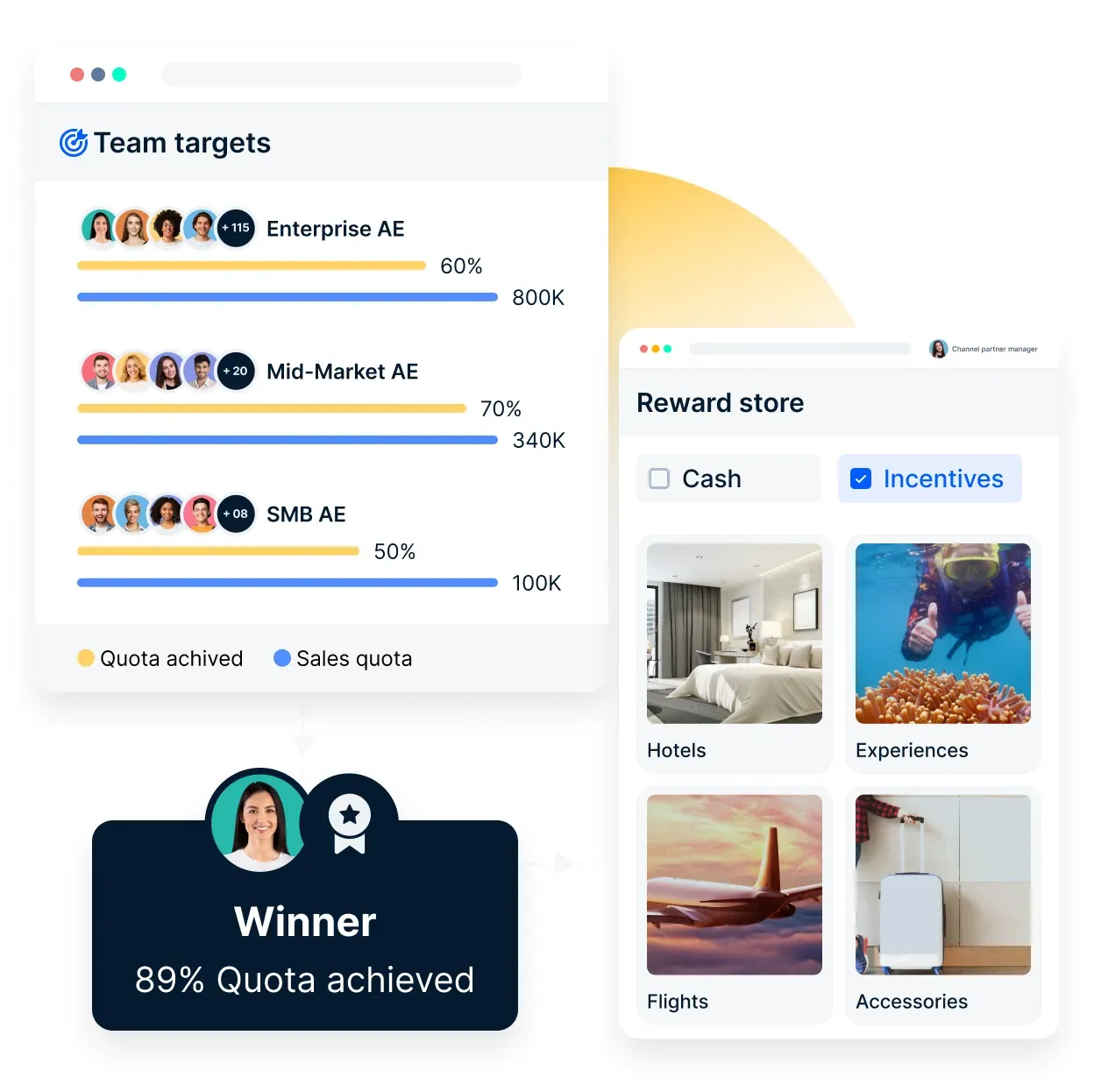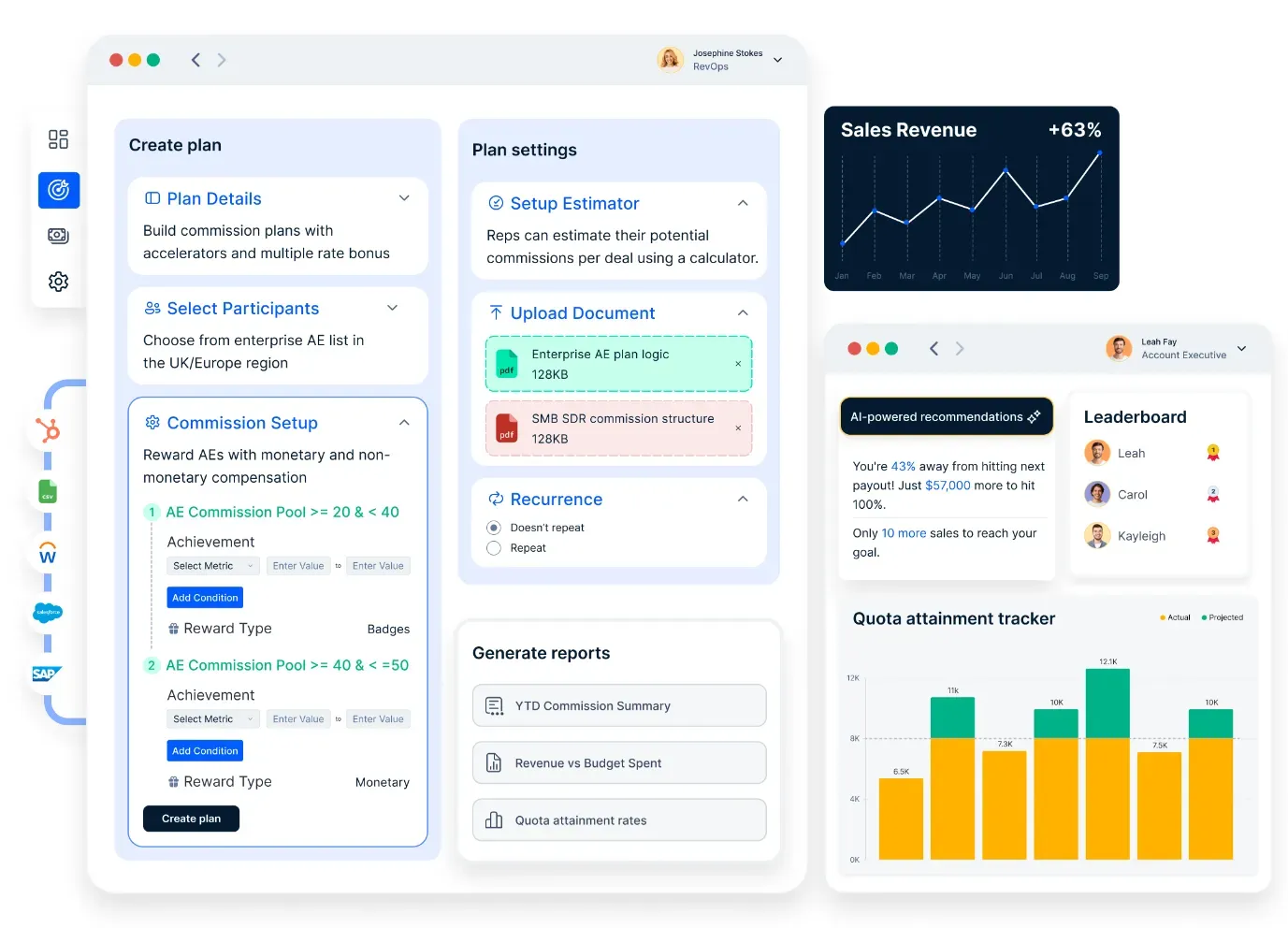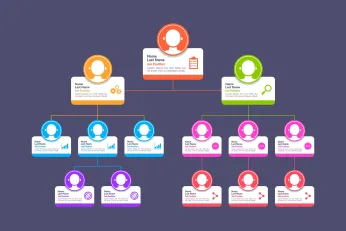5 Ways Incentive Automation Boosts Sales & Productivity
Struggling with manual sales incentives? Incentive automation simplifies commission tracking, boosts engagement, and accelerates sales. Discover how automation fuels business growth!
On this page
One of the biggest challenges for startups is getting high participation in their sales incentive programs. Imagine having a great rewards program, but sales reps aren’t fully engaged. That’s exactly what happened with Nimble Storage, a cloud technology innovator. Their award-claim process was slow and time-consuming, leading to inefficiencies.
This is where sales incentive automation becomes a game-changer for startups and SMBs. In fact, 90% of top-performing companies use incentive programs to keep their sales teams motivated.
So, in this blog we will share why your startup, and small businesses need a sales automation tool.
What is sales incentive automation?
Sales incentive automation is the use of software and digital tools to streamline the management, tracking, and distribution of sales incentives, such as commissions and bonuses. It eliminates manual processes, reducing errors and ensuring timely payouts. By automating incentive compensation management, businesses can enhance efficiency, boost sales performance, and improve transparency.
Challenges of manual sales incentive processing for startups and SMBs
As a startup CEO or founder, you're likely wearing multiple hats, from product development to team management and, crucially, sales. Early on, you may have been the one doing all the selling, driven by your passion for your product. But as your startup grows, the need for a dedicated sales team becomes more pressing. This growth brings a new set of challenges, especially in managing your sales reps effectively and efficiently.
One of the most common struggles startups and SMBs face is the management of sales incentives. When incentive programs are handled manually, using tools like Excel or relying on HR teams, the process becomes slow, prone to errors, and ultimately demotivates your team. Inaccurate or delayed rewards can even lead to higher turnover rates. That’s where automation comes in—specifically, sales incentive automation. Here are the key challenges:
- Errors and inaccuracies: Manual calculations in spreadsheets are prone to mistakes, leading to disputes and dissatisfaction among sales reps who may feel underpaid.
- Time-consuming administration: Sales managers and finance teams spend countless hours on commission calculations, performance tracking, and payout processing—time that could be used for strategic sales planning.
- Lack of transparency: Without a clear system, sales reps may struggle to track their incentive earnings, which can reduce motivation and impact overall sales performance.
- Misaligned incentives: Designing effective sales commission structures manually is complex. If incentives aren’t aligned with business goals, it becomes difficult to drive the right sales behaviors.
- Delayed or incorrect payouts: Late or inaccurate commission payments can frustrate sales reps, lower morale, and erode trust in the organization.
By adopting sales commission automation software, businesses can overcome these challenges, ensuring accurate calculations, real-time tracking, and faster payouts. Automating sales incentives not only saves time but also creates a more motivated and high-performing sales team.
How Compass, an ICM software, can streamline and automate the sales incentive program
Sales incentive automation is about using technology to manage and roll out incentives more accurately, efficiently, and in real-time. For startups, where resources and budgets are limited, automation can significantly reduce the overhead costs of manually managing sales incentives.
Compass automate everything from tracking commissions to generating reports, freeing up valuable time for your sales managers to focus on what really matters—selling and supporting their teams.

1. Helps you automate
Sales incentive automation helps you considerably automate sales incentives making them much faster and accurate. Maintaining sales data on Excel sheets is tiring and rarely motivating.
Your sales reps are expected to be better at Excel than sales as long as they rely on Excels for incentives considering how complex the formulae can get. The worst part, you cannot even backtrack. Tracking incentives manually makes them slow, manual, prone to errors, and hence, delayed and incorrect.
2. Better ROI
When operating in a small setup, every resource counts. Having a dedicated resource for calculating incentives and for rolling out payments has 2 major disadvantages. Firstly, it is extremely expensive and it is manual, slow, and error-prone.
With Compass, you can automate this and free upon fixed monthly expenses and have your resources focus on the core product, whether it is building, coding, or selling it which helps drive better ROI and has a lower payback period.
3. Immediate implementation
It is not uncommon for a tech-based company to think about building a product in-house to solve sales vows. But having dedicated resources to build software that is not for the core business dilutes the purpose.
The burden of product development, quality assurance, maintenance, platform migration, and patch fixes bugs down a small team where the time, effort, and cost spent on each resource is crucial. Especially when there are solutions on the market that address relevant business challenges and lower implementation costs and time.
With easy integrations and a robust product, Compass is built to handle the most complex incentive programs with a no-code platform that can be implemented almost immediately.
4. Built for the future
While operating with a smaller team may come with some challenges, it surely has some of the greatest perks. Implementing any tech-based product takes relatively little time and less effort as compared to deploying it for a large enterprise.
It is also, in most cases, a more successful project than in larger organizations considering there’s little resistance. The best part of implementing a tech-based solution for a smaller setup is because the organization grows while leveraging technology and is hence, since the beginning future-ready.
At Compass, we have built a product for the growing sales teams to become future-ready and our only aim is to ‘Democratize sales commissions’.
Compass focuses on the underlying fact: Sales acceleration is about re-engaging with the sales teams for enhanced accountability and performance by using levers that they crave for - meaningful and timely rewards, lucrative commission plans, and instant payments.
This is where gamification comes in. It is a powerful strategy that turns routine tasks into exciting challenges. Gamification in sales involves adding game-like elements (points, badges, leaderboards, rewards) to your incentive programs. Not only does this boost engagement, but it also fosters a healthy sense of competition within your sales team, making the work environment more fun and motivating.
Make automated incentive program engaging with gamification
Incorporating gamification alongside automation makes sense for startups and SMBs looking to maximize their sales team’s potential. Sales reps are no longer just focused on closing deals—they’re motivated by the excitement of earning rewards, leveling up, and seeing how they stack up against their peers.
Tools like Compass offer gamified features, such as customizable leaderboards, reward systems, and team challenges, that can drive better performance and collaboration.

Increased engagement: Automated systems ensure that rewards are calculated and distributed accurately and on time. Meanwhile, gamification makes the process fun and engaging, motivating your sales team to perform at their best.
Improved performance: Sales teams spend less time on manual tasks and more time closing deals. With clear incentives, gamified rewards, and automation, performance accelerates.
Better ROI: Automating commissions reduces overhead costs and inefficiencies, giving your business a better return on investment. Sales reps are also more likely to stay with your company when they see a direct, tangible link between performance and rewards.
Scalable growth: Automation ensures that as your sales team grows, the incentive process scales with them. Whether you have a team of 5 or 50, automation helps maintain consistency and reduces the burden on your HR or finance teams.
Enhanced customer experience: Automation and gamification free up time for your sales team to focus on building stronger customer relationships, which leads to better retention rates and more revenue in the long run. Compass is a great example of an automation tool that can significantly help in fast-tracking the sales process.
Chat boxes and voice assistants are also evolving into brilliant companions, crafting tailor-made experiences. Immerse yourself in the mesmerizing realm of virtual and augmented reality, where vibrant worlds blend with reality, igniting your senses like never before.
Striking a balance between automation and gamification
While automation and gamification offer tremendous benefits, it’s important to address potential challenges. For example, over-automation can make interactions feel robotic or impersonal. Sales teams still need that human touch, especially when dealing with high-value clients. The key is to balance personalization with the power of automation, ensuring that while tasks are automated, the customer relationship remains genuine.
Similarly, gamification can sometimes lead to unhealthy competition if not carefully managed. Not all sales reps respond the same way to competitive environments, so it’s crucial to create fair and inclusive incentive programs that motivate everyone on the team, not just the top performers.
Compass ensures that your incentive programs remain balanced and fair by offering flexible and customizable features that cater to the unique needs of each team member, creating a healthy, motivating environment for everyone.
Take the matter of Mahindra Finance as an example. Mahindra Finance strikes the balance of automation and gamification perfectly.
Problem:
- Data chaos: Information for calculating incentives was scattered across various systems, making it difficult and time-consuming to retrieve. This also led to frequent data loss and inefficiencies.
- Integration problems: Combining data from these different sources was a complex and error-prone process, causing delays in calculating incentive payouts.
- Scheme shuffle: With numerous incentive plans tailored to different regions, frequent updates and manual adjustments were needed, increasing the risk of mistakes.
- Exception overload: Unique situations in different regions made it hard to standardize the process, requiring a lot of manual intervention.
- Recalculation rollercoaster: Time-consuming recalculations due to cheque clearances and audits were prone to errors and left sales representatives in the dark about their actual earnings.
- Demotivated workforce: Delays and inaccuracies in incentive payments led to decreased morale and productivity among sales representatives.
Solutions:
- One stop shop for data: They created a central platform using Plum's data integration tools, bringing all the information needed for incentives into one place. This eliminated data retrieval issues and minimized data loss.
- Automation: Manual data processing became a thing of the past. Automated systems handled large data volumes quickly and accurately.
- Real-time rewards: Incentive calculations happened instantly based on pre-defined rules, ensuring timely and accurate payouts to sales representatives.
- Scheme: Updating and managing various incentive schemes across regions and products became a breeze with this flexible system.
- Transparency: A clear and transparent system allowed sales representatives to see their performance and incentive calculations in real-time. No more waiting in the dark!
- Smart algorithms: Smart algorithms were put in place to handle exceptions and unique situations automatically, reducing the need for manual intervention and improving accuracy.
Results:
- Rewarding more achievers: The number of sales representatives qualifying for incentives jumped by over 25%, ensuring more people received well-deserved recognition.
- Near-perfect accuracy: Calculation errors plummeted by over 98%, leading to a highly reliable and trustworthy system.
- Lightning speed payouts: Processing times for incentives shrunk by over 99%, resulting in payments being made within hours instead of days. This significantly boosted cash flow for the representatives.
- Happy and productive workforce: Employee morale and productivity soared, with a 30% increase in sales performance. Satisfied employees are more engaged and deliver better results!
- Streamlined operations: Incentive management became significantly more efficient, with a 40% reduction in the time spent on administrative tasks. This freed up valuable time for other crucial activities.
Full compliance with audit requirements was achieved, eliminating the risk of regulatory issues and potential fines. This provides peace of mind for both the company and its employees.
How Compass can help your startup scale with sales incentive automation

The real challenge for startups is maintaining a lean, effective operation while scaling. With Compass, you get an incentive automation solution that is built for growing teams. Compass is designed to handle complex incentive structures, and it’s incredibly easy to implement. You don’t need a dedicated IT team or complicated setups—Compass integrates seamlessly with your existing systems, providing a no-code platform for your incentive programs.
The integration of gamification in business alongside automation is revolutionizing the future of sales. Gamification in business offers a fresh and exciting approach to driving productivity and performance.
Similarly, commission automation tools such as Compass are helping to eliminate tedious manual tasks, allowing sales reps to focus on driving revenue. The combination of strategies can significantly enhance team performance, ultimately leading to business growth.
So, if you are looking to take your sales team's performance to the next level, implementing gamification ideas and utilizing commission automation platform tools like Compass is a must. With the use of adequate tools, businesses can create a culture of continuous improvement, foster employee engagement, and achieve objectives with ease.
While you focus on building better, more commercial products and launching them across geographies, Compass helps you accelerate your sales team performance so that you can only focus on building a better product.
Book a demo now and leverage the Compass advantage!
FAQ's
Q: What is CRM sales automation?
A: CRM sales automation refers to using CRM (Customer Relationship Management) systems to automate tasks related to customer interactions and sales processes, such as follow-ups, lead tracking, and pipeline management. Tools like Compass integrate seamlessly with your CRM, offering automated commission tracking, personalized incentives, and real-time performance updates to enhance the overall sales process.
Q: What are the best sales automation tools?
A: The best sales automation tools are those that help streamline lead management, task automation, performance tracking, and customer relationship management. Compass is a top tool for automating sales incentives, offering features like real-time commission tracking, customizable reward systems, and gamification elements that keep your team engaged and motivated. Other popular tools include HubSpot, Salesforce, and Zoho, but Compass stands out for its simplicity and focus on sales incentives.
Q: How to do sales for a startup?
A: For startups, it’s crucial to focus on building a strong sales process, leveraging tools that automate key tasks, and maintaining a personalized approach. Use automation platforms like Compass to handle sales incentives and streamline processes like commission tracking, so your sales team stays motivated and focused on closing deals rather than administrative tasks. Implement CRM systems to track customer interactions and optimize sales efforts.
How do I automate my sales?
A: You can automate your sales by using sales automation tools that streamline repetitive tasks like lead management, follow-ups, and commission calculations. Platforms like Compass allow you to automate incentive programs, calculate commissions accurately in real time, and manage performance, freeing up your team to focus on what matters—closing deals and building customer relationships.














